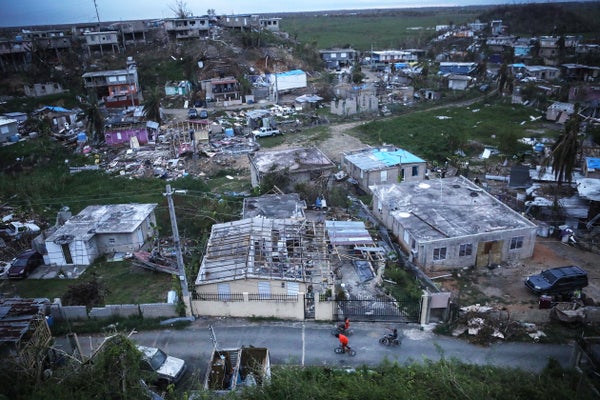Puerto Rico Sues Oil Companies for $1 Billion in Climate Damages
Puerto Rico is suing fossil fuel companies over climate damages, saying that the industry knew about the dangers of its products and that the island is paying the price
Kids bike in an area without grid power or running water about two weeks after Hurricane Maria swept through the island on October 5, 2017 in San Isidro, Puerto Rico. The island is seeking to hold the oil industry financially responsible for hurricanes and other disasters that may be worsened by rising temperatures.
CLIMATEWIRE | Puerto Rico is suing the oil and gas industry for at least $1 billion, joining the ranks of more than two dozen cities, counties and states that are seeking compensation for the effects of climate change.
Filed Monday in the Court of First Instance of San Juan, the lawsuit claims that despite knowing their products would pollute the island and cause temperatures to warm, Exxon Mobil, BP, Chevron and other companies marketed and promoted oil and gas using unfair and deceptive trade practices.
The lawsuit alleges that the companies failed to provide warnings about the environmental risks associated with burning fossil fuels.
On supporting science journalism
If you’re enjoying this article, consider supporting our award-winning journalism by subscribing. By purchasing a subscription you are helping to ensure the future of impactful stories about the discoveries and ideas shaping our world today.
“These companies have known internally for decades that greenhouse gas pollution from fossil fuel products would have adverse impacts on the global climate and sea levels,” said Justice Secretary Domingo Emanuelli Hernández in announcing the lawsuit.
But even as oil companies took steps to protect their own assets from climate change, he said, they “failed to truthfully warn Puerto Rican consumers about the consequences of using and burning fossil fuels on the Island, as well as their impact on the environment.”
The lawsuit says that Puerto Rico has incurred billions of dollars in costs to clean up climate-fueled disasters, including coastal erosion caused by rising sea levels and more frequent and severe storms. The lawsuit calls for oil companies to contribute to a fund to mitigate environmental damages and strengthen infrastructure against sea level rise and storm damage.
Phil Goldberg, special counsel to the Manufacturers’ Accountability Project, an initiative of the National Association of Manufacturers, which opposes the climate liability lawsuits, said Puerto Rico’s challenge is not going to lead to a solution.
“The challenge of our time is developing technologies and public policies so that the world can produce and use energy in ways that are sustainable for the planet while being affordable to people,” Goldberg said. “It should not be figuring out how to creatively plead lawsuits that seek to monetize climate change and provide no solutions.”
Puerto Rico is at least the third local government to sue the oil industry this year in an effort to hold energy producers financially accountable for the effects of climate change. If successful, the lawsuits could put the industry on the hook for billions of dollars.
The industry has called the climate liability suits a waste of time and has argued that energy policy should be decided by legislators. Companies have tried to have the cases moved to federal court, where they believe they are more likely to fail, and they have asked for help from the Supreme Court.
Puerto Rico’s lawsuit comes just days after a Maryland judge delivered a major victory to the industry, rejecting the city of Baltimore’s 2018 climate liability challenge against BP and other oil producers. Like many of the other climate lawsuits, Baltimore had accused oil majors of knowingly misleading consumers about the dangers of burning fossil fuels.
There is already one climate lawsuit pending in Puerto Rico. More than a dozen municipalities filed suit in 2022 in the U.S. District Court for the District of Puerto Rico, asking the industry for compensation related to the 2017 hurricane season that killed thousands of people and left much of the island without power for nearly a year.
Exxon at the time of Puerto Rico’s last lawsuit said that cases like it “waste millions of dollars of taxpayer money and do nothing to advance meaningful actions that reduce the risks of climate change.”
The company said that it would “continue to invest in efforts to reduce greenhouse gas emissions while meeting society’s growing demand for energy.”
Reprinted from E&E News with permission from POLITICO, LLC. Copyright 2024. E&E News provides essential news for energy and environment professionals.




















Discussion about this post